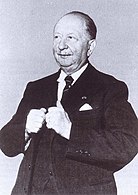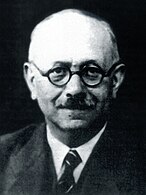 Global Information
Global InformationAnnales school information
The Annales school (French pronunciation: [a'nal]) is a group of historians associated with a style of historiography developed by French historians in the 20th century to stress long-term social history. It is named after its scholarly journal Annales. Histoire, Sciences Sociales, which remains the main source of scholarship, along with many books and monographs.[1] The school has been influential in setting the agenda for historiography in France and numerous other countries, especially regarding the use of social scientific methods by historians, emphasizing social and economic rather than political or diplomatic themes.
The school deals primarily with late medieval and early modern Europe (before the French Revolution), with little interest in later topics. It has dominated French social history and heavily influenced historiography in Europe and Latin America. Prominent leaders include co-founders Lucien Febvre (1878–1956), Henri Hauser (1866–1946) and Marc Bloch (1886–1944). The second generation was led by Fernand Braudel (1902–1985) and included Georges Duby (1919–1996), Pierre Goubert (1915–2012), Robert Mandrou (1921–1984), Pierre Chaunu (1923–2009), Jacques Le Goff (1924–2014), and Ernest Labrousse (1895–1988). Institutionally it is based on the Annales journal, the SEVPEN publishing house, the Fondation Maison des sciences de l'homme (FMSH), and especially the 6th Section of the École pratique des hautes études, all based in Paris. A third generation was led by Emmanuel Le Roy Ladurie (1929–2023) and includes Jacques Revel,[2] and Philippe Ariès (1914–1984), who joined the group in 1978. The third generation stressed history from the point of view of mentalities, or mentalités. The fourth generation of Annales historians, led by Roger Chartier (born 1945), clearly distanced itself from the mentalities approach, replaced by the cultural and linguistic turn, which emphasizes the social history of cultural practices.
The main scholarly outlet has been the journal Annales d'Histoire Economique et Sociale ("Annals of Economic and Social History"), founded in 1929 by Lucien Febvre and Marc Bloch, which broke radically with traditional historiography by insisting on the importance of taking all levels of society into consideration and emphasized the collective nature of mentalities. Its contributors viewed events as less fundamental than the mental frameworks that shaped decisions and practices. However, informal successor as head of the school was Le Roy Ladurie. Multiple responses were attempted by the school. Scholars moved in multiple directions, covering in disconnected fashion the social, economic, and cultural history of different eras and different parts of the globe. By the time of crisis the school was building a vast publishing and research network reaching across France, Europe, and the rest of the world. Influence indeed spread out from Paris, but few new ideas came in. Much emphasis was given to quantitative data, seen as the key to unlocking all of social history.[3] However, the Annales ignored the developments in quantitative studies underway in the U.S. and Britain, which reshaped economic, political, and demographic research.[4] An attempt to require an Annales-written textbook for French schools was rejected by the government.[5] By 1980 postmodern sensibilities undercut confidence in overarching metanarratives. As Jacques Revel notes, the success of the Annales school, especially its use of social structures as explanatory forces, contained the seeds of its own downfall, for there is "no longer any implicit consensus on which to base the unity of the social, identified with the real".[6] The Annales school kept its infrastructure, but lost its mentalités.[7]
- ^ See for recent issues Archived 2008-09-28 at the Wayback Machine
- ^ Since 1978, Revel has taught at the École des Hautes Études en Sciences Sociales (Paris), where he is directeur d'études (full professor); he served as president of the École from 1995 to 2004.
- ^ One of numerous spin-off journals was Histoire & mesure (1986– ), devoted to quantitative history.
- ^ Iggers, Georg G. Historiography in the Twentieth Century: From Scientific Objectivity to the Postmodern Challenge. pp. 59–61.
- ^ Hunt (1986)
- ^ Jacques Revel and Lynn Hunt, "Microanalysis and the Construction of the Social", in Histories: French Constructions of the Past, ed. by Jacques Revel and Lynn Hunt (1995) 480.
- ^ On the decline of Annales, see Hunt (1986); for a summary of the movement, see Burke, French Historical Revolution, 106–107.

